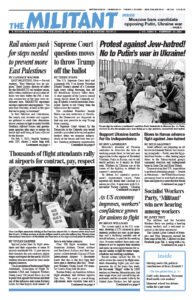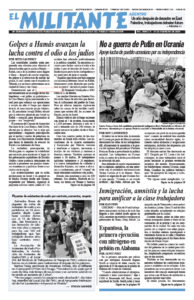In the largest anti-war manifestation since Russian President Vladimir Putin invaded Ukraine almost two years ago, some 200,000 people waited in lines stretching for city blocks all across the country in January to sign petitions to put Boris Nadezhdin on the ballot for the March presidential election. Nadezhdin, a 30-year politician and currently a City Council member in Dolgoprudny, north of Moscow, is an outspoken opponent of Putin’s war, calling it a “fatal mistake.”
“Boris Nadezhdin is our collective ‘No,’” Lyosha Popov, who collected signatures in Yakutsk, south of the Artic Circle, told the New York Times. “I am here collecting signatures against Putin, against military action.”
Alexander Rakityansky signed a petition in St. Petersburg. Originally from Belgorod, a border city with Ukraine that’s been caught up in the war, he said he backed Nadezhdin so his hometown “doesn’t get bombed and people don’t die on the streets.”
Karen Danielyan, a 20-year-old from Tver, north of Moscow, was determined to give her name and passport details as required to sign the petition. “The fear that this will continue further is much stronger and heavier than the fear that they will do something to me for working as a signature collector,” she said.
On Feb. 8 Putin’s election commission disqualified Nadezhdin’s petitions, claiming that “invalid signatures” left him just short of the 100,000 required. He is one of two anti-war candidates thrown off the ballot. Former TV journalist Yekaterina Duntsova had been disqualified Dec. 23.
Nadezhdin called the ruling against him political. The “official understanding is that all the society is for Putin,” he told Al Jazeera. “But it’s not so. The majority of people in Russia want the conflict in Ukraine to stop.” Nadezhdin says he will appeal to the Russian Supreme Court.
“The fact that we saw lines of support on the streets of Russian cities was an unpleasant surprise for the Kremlin,” one regime figure who declined to give his name told the Moscow Times.
Three other candidates, all supporters of the war, are running in the election, none of them serious challengers. One is Nikolai Kharitonow, the candidate for the Communist Party, who praises Joseph Stalin’s forced collectivization of Soviet agriculture in the 1930s that led to millions being starved to death, a policy carried out with special brutality in Ukraine.
Independent polling had shown close to 10% saying they would vote for Nadezhdin, higher than the other three combined.
Putin will assure he is reelected with a large majority. But that won’t end the growing opposition against his war on Ukraine.

